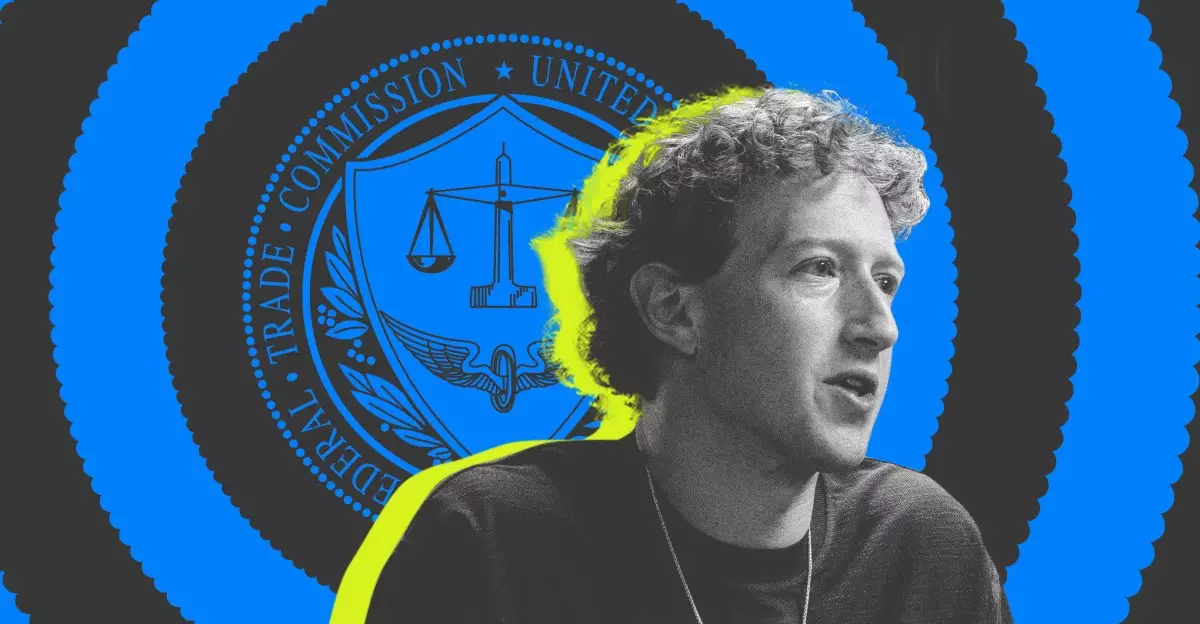In the ever-evolving world of social media, few names dominate the discourse as much as Meta, formerly known as Facebook. As Mark Zuckerberg stands firm in the face of an antitrust trial brought on by the Federal Trade Commission (FTC), we are given a rare chance to peer into the decision-making labyrinth that defined the trajectory of this colossal digital empire. Notably, Zuckerberg’s reflections on various paths not taken offer a potent reminder of how seemingly minor choices can shape the contours of entire industries.
At the heart of the litigation lies the FTC’s assertion that Meta’s acquisitions of Instagram and WhatsApp were strategic moves designed to stifle competition, thereby solidifying its monopoly on personal social networking services. A vital question emerges: What if Meta had taken a different path, one that didn’t involve the acquisition of these rapidly growing platforms? Would the social media landscape look substantially different if Instagram had remained a standalone entity or if Snapchat had joined the Meta family?
The Illusion of Control
As Zuckerberg testified for nearly nine hours, his resistance to the FTC’s framing of the market became evident. He portrayed the social media realm as “fluid,” with competitors like TikTok, YouTube, and iMessage rising to overshadow traditional platforms. This insistence raises eyebrows: Is the market indeed as elastic as he claims, or is it merely a facade crafted to uphold Meta’s dominance? With his nuanced responses, Zuckerberg adeptly navigates the court’s inquiries, showcasing both an understanding of the market dynamics and an undeniable defensiveness about his company’s practices.
His testimony suggests that Zuckerberg views his empire not merely as a behemoth to be scrutinized but rather as a collection of interconnected services that serve a universal need: connectivity. The marketing strategy that emphasizes Facebook’s role in connecting friends may be a well-tailored narrative, but it raises questions about whether Zuckerberg believes in such a vision—or if he is simply trying to align with a more favorable public perception.
Missed Opportunities and Rivalry Dynamics
Zuckerberg’s revelations about what could have been provide a fascinating insight into his strategic mindset. For instance, had CEO Evan Spiegel accepted a staggering $6 billion offer for Snapchat in 2013, the dynamics of competitor rivalry may have shifted drastically. Zuckerberg speculated on how metamorphosing Snapchat into a part of the Meta ecosystem might have accelerated its growth, hinting that competition isn’t simply about surviving but about how alliances create new opportunities.
This notion prompts further inquiry: What would social media look like today if Snapchat had been a Meta product? Would we be experiencing a diluted version of Snapchat’s quirky, ephemeral content, or something more innovative altogether? In a world that thrives on constant evolution, the implications of such acquisitions reach far beyond financial gains or losses. They speak to the foundation of creativity and innovation that drives technological platforms.
Complexity Behind a Simplistic Image
Beyond hypothetical mergers lies the reality of internal decisions and their implications for the user experience. Zuckerberg’s notion of wiping users’ friend lists to recapture the initial thrill of social networking illuminates a deeper anxiety within the organization—an acknowledgment that the platform could be veering off course. Such drastic measures highlight an unsettling truth: the very essence of social media can become bogged down by its own success.
Additionally, the idea of a purely ad-driven feed—suggesting that users might prefer ads over “regular” content—betrays a troubling perspective on user engagement. It raises ethical questions about the direction in which Meta’s business model is driving the social media experience. Are users simply monetized avatars swayed by advertisements, or do they desire genuine engagement within their online communities?
The Shadows of Control and Competition
Internal communications unveiled during the trial further explore Zuckerberg’s fears about market positioning. The anxiety surrounding Instagram’s exponential growth and messaging platforms encroaching upon social media underscores an abiding concern—can established giants maintain their relevance amidst emerging competitors?
What was once a pioneering vision of digital socialization may teeter on the brink of obsolescence if left unexamined. In their pursuit of market dominance, tech giants must wrestle with a pivotal question: Is the quest for control worth sacrificing innovation? The complexities underlying Meta’s expansive ecosystem call into question the sustainable future of not only Zuckerberg’s empire but the very nature of social interaction itself.
The drama unfolding in the courtroom reveals what’s at stake—not just for Meta, but for the very fabric of digital communication as we know it.

